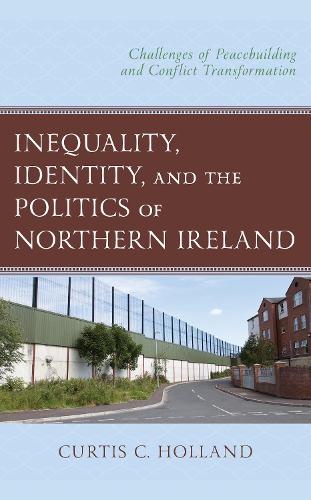
Inequality, Identity, and the Politics of Northern Ireland: Challenges of Peacebuilding and Conflict Transformation
(Hardback)
Available Formats
Publishing Details
Inequality, Identity, and the Politics of Northern Ireland: Challenges of Peacebuilding and Conflict Transformation
By (Author) Curtis C. Holland
Bloomsbury Publishing PLC
Lexington Books
1st August 2022
United States
Classifications
Professional and Scholarly
Non Fiction
Social theory
303.6609416
Physical Properties
Hardback
248
Width 160mm, Height 227mm, Spine 20mm
499g
Description
The peace process in Northern Ireland is often posited as the poster child for successful post-conflict social and political reform. Yet the sustained cessation of violence and growth of the middle-class is paralleled by underinvestment and systemic neglect of those deprived communities most affected by the legacy of the Troubles, having stark implications on the scope of peacebuilding. Inequality, Identity, and the Politics of Northern Ireland: Challenges of Peacebuilding and Conflict Transformation examines how the politics of threat and resentment, undergirded by persistent poverty and socioeconomic and gender inequalities across Catholic and Protestant communities shape political conflict, while at the same time opening up new potential sociopolitical avenues of resistance and transformation at the community level. Curtis C. Holland examines how, in the context of rising inequality, emerging intersectional class/place, gendered, and ethnonational identities have been manipulated by ethnopolitical entrepreneurs to incite conflict but can also produce subjectivities through which alternative visions of peace may emerge. The book documents key discourses and events which contribute to insular ethnic identity formation and interethnic conflict but also examines how the same discourses are subject to the agency of citizens, whose reflexivity on the ethnopolitical manipulation and inequalities faced by their communities may potentially provide new prospects for social and political transformation.
Reviews
Northern Ireland remains a deeply polarized, segregated, and sectarian society as intra-group inequalities harm vulnerable marginalized intra-group members while ethnopolitical entrepreneurs fluctuate between compromise and threat politics. Professor Curtis Holland used a mixed method case study to draw on data generated from forty-one in-depth interviews with Belfast community leaders and politicians and a content analysis of British and Irish newspapers. This wonderful, well written, and highly accessible book uses a constructivist and intersectional approach to analyze the impact of relational and ethno-social fields of power, resistance narratives, and class inequalities that shape local everyday peoples agencies across and within their ethnopolitical groups in post-peace-accord Northern Ireland. This excellent study deserves a broad readership from academics, community activists, peacebuilders, policymakers, politicians, students, and those interested in the top-down and bottom-up dynamics of post-peace-accord societies like Northern Ireland.
-- Sean Byrne, University of ManitobaAuthor Bio
Curtis C. Holland is assistant professor at the State University of New York at Old Westbury, where he teaches for the criminology and sociology programs.
